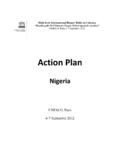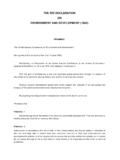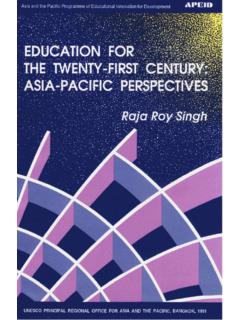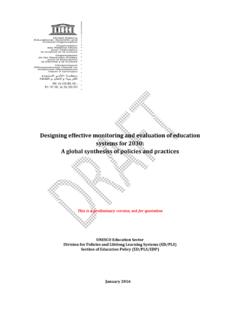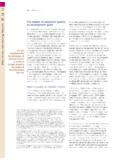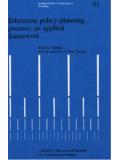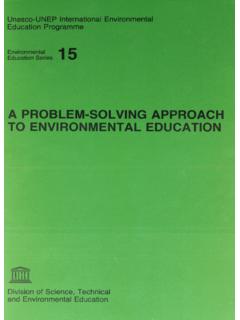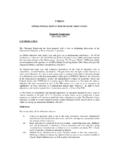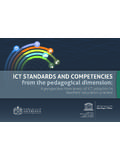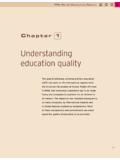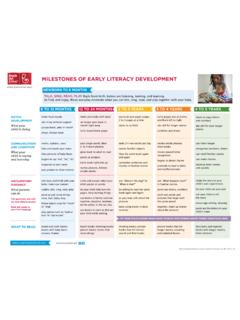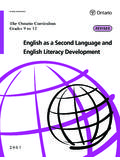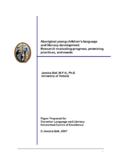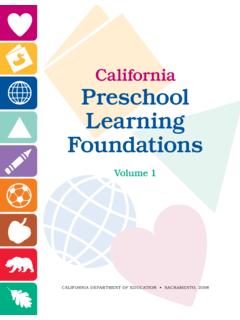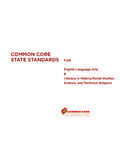Transcription of Why literacy matters - UNESCO
1 6002 Education for All Global Monitoring ReportChapter5 Why literacymattersThis chapter explores the case for literacy , especially for youth and adults. It summarizesthe foundations of the right to literacythrough a review of international agreements,noting that literacy is both a right in itselfand an instrument for achieving other chapter then reviews the broaderbenefits that result from literacy , in human,economic, social and cultural terms. Sinceliteracy is a key outcome of education, it isdifficult to separate the right to literacy fromthe right to education or the benefits of literacy from those of for All Global Monitoring Report136/ CHAPTER 5 literacy as a rightLiteracy is a right. It is implicit in the right toeducation. It is recognized as a right, explicitly forboth children and adults, in certain internationalconventions. It is included in key 1948 Universal Declaration of HumanRights recognizes the right to education, as doother binding international conventions.
2 Theseinclude the International Covenant on Civil andPolitical Rights (ICCPR) and the InternationalCovenant on Economic, Social and CulturalRights, both adopted in 1966, which, together withthe Universal Declaration of Human Rights, wereproclaimed by the United Nations as constitutingthe International Bill of Human Rights. Otherimportant instruments include the 1979 Convention on the Elimination of all Forms ofDiscrimination against Women (CEDAW) and the1989 Convention on the Rights of the Child (CRC).1 The 1975 Persepolis Declaration, the CRC andCEDAW further recognize literacy , rather than justeducation, as a right. The 1960 Convention againstDiscrimination in Education (CDE) specificallytackles the issue of those who have not attendedor completed primary education. The PersepolisDeclaration states: literacy is not an end in is a fundamental human right ( UNESCO , 1975a).Both the CRC and CEDAW refer to the promotionof literacy and the eradication of illiteracy.
3 Forexample, Article 10(e) of CEDAW, which enteredinto force in 1981, recognizes the right of adults toliteracy, calling on parties to ensure that men andwomen have the same opportunities for access to programmes of continuing education, includingadult and functional literacy programmes . TheCRC characterizes literacy as a basic skill towhich children are entitled and stresses the needto rid the world of illiteracy (UNHCHR, 1989). Astrategic objective of the 1995 Beijing Declarationand Platform for Action is to eradicate illiteracyamong women . The CDE directs states to encourage and intensify by appropriate methodsthe education of persons who have not receivedany primary education or who have not completedthe entire primary education course and thecontinuation of their education on the basis ofindividual capacity ( UNESCO , 1960). The CDEfurther mandates increasing opportunities forliteracy via continuing is considerable pressure for a renewedemphasis on literacy as a right.
4 The HamburgDeclaration states under Resolution 11: literacy ,broadly conceived as the basic knowledge andskills needed by all in a rapidly changing world, isa fundamental human right ( UNESCO , 1997). TheUNESCO round-table report literacy as Freedomrecommends that literacy be understood within arights-based approach and among principles ofinclusion for human development ( UNESCO ,2003c).Less clear than the right to literacy has beenthe understanding of literacy in these variousconventions and declarations. Couching the rightmainly in terms of eradicating illiteracy, as inCEDAW and the Beijing Declaration, implies theequivalence of literacy with knowledge or ofilliteracy with ignorance. Where literacy as a rightderives from the right to education, it is seen more as a set of skills that constitute fundamental or basic education, as the CDE implies. From thefounding of UNESCO , the term fundamentaleducation has signified the skills of reading,writing and calculating, with a heavy emphasis on reading and writing ( UNESCO , 2003d).
5 Whilenumeracy is usually mentioned alongside literacyin legal instruments, the word literacy itself isgenerally limited to reading and writing Comment 1 of the CRC (Article 29), forexample, establishes that basic skills include not only literacy and numeracy but also life skills (UNHCHR, 1989). In this context, literacy meansreading and writing only. The World Declarationon Education for All (Jomtien, Thailand, 1990) in Article , includes literacy , oral expression,numeracy, and problem solving as essentiallearning tools that comprise the basic learningneeds of every person ( UNESCO , 1990).Key to the interpretation of literacy as readingand writing skills is the issue of the language inwhich one learns to read or write. The right tolearn a language is quite different from the rightto learn inthat language. Article 27 of the ICCPR sets forth the right of persons belonging tominorities to use their own language; this wouldmean at least the right to speak minoritylanguages in private.
6 International law makesclear that the state has the right to determineofficial languages, which will rarely if everencompass all or most minority languages. Publiceducation may well be provided in a variety oflanguages beyond the official ones. In Namibia,for example, the national literacy programme hasthree stages, the first two in mother tongue andthe third introducing basic English, so thatlearners with different levels of literacy can beaccommodated. Where public education isLiteracy shouldbe understoodwithin a rights-based approachand amongprinciples ofinclusion forhumandevelopment1. See Chapter 1 of the 2003/4 Report for a detailed discussion of the right to literacy matters /137provided only in the official language, the ICCPR stresses, the state should recognize the right toestablish private schools to assure the possibilityof pluralism in education and avoid statemonopolization. The increasing emphasis onbilingual formal education (Box ) has alsoinfluenced adult and youth programmes in thenon-formal documents, including the Persepolis andHamburg Declarations, allow for an expandedinterpretation of literacy beyond the skills ofreading and writing.
7 literacy can include accessto scientific and technical knowledge, to legalinformation, to means of enjoying the benefits ofculture and to the use of media, both for thoseseeking greater access and those with no access(Organization of American States, 1948; UnitedNations, 1995; UNHCHR, 1969). literacy is alsointerpreted as a foundational, universal life skillfor those in adverse circumstances; for example,Article 22 of the Convention relating to the Statusof Refugees guarantees refugees the sametreatment as is accorded to nationals with respectto elementary education (UNHCHR, 1951). As atool, literacy has the potential to meet people smost vital needs and to stimulate social, cultural,political and economic participation, especially onthe part of disadvantaged groups. Emphasis oninclusive lifelong educational provision reflectsthe international community s recognition of theuniversal human need for and right to literacy ( UNESCO , 1975band 1997).An additional noteworthy trend concernsliteracy in relation to technology, civicengagement and lifelong learning.
8 UNESCO sB@bel Initiative seeks to encourage informationdissemination, placing particular emphasis on the potential of communication technologies tomaintain and advance cultural and linguisticdiversity ( UNESCO , 2005a). The United NationsDevelopment Programme (UNDP) asserts thatpossessing knowledge, having access toresources for a decent standard of living andparticipating in community life constitute basiccapabilities for human development (UNDP,2004a). Access to these tools, skills andresources lends greater assurance to thedevelopment of literacy . literacy is inextricablylinked to a process of continual education orlifelong , literacy has been recognized not onlyas a right in itself but also as a mechanism forthe pursuit of other human rights, just as humanrights education is a tool for combating Vienna Declaration and Programme of Actioncalls on states to eradicate illiteracy, linking suchefforts to greater respect and protection forhuman rights and personal liberties; it alsoemphasizes the use of human rights-informededucation as a means of combating illiteracy(UNHCHR, 1993).
9 Particularly significant in thisrespect are the rights of women, who currentlyconstitute the majority of the world s benefits of literacy2 The rationale for recognizing literacy as a right is the set of benefits it confers on individuals,families, communities and nations. Indeed, it is widely reckoned that, in modern societies, literacy skills are fundamental to informeddecision-making, personal empowerment, activeand passive participation in local and global socialcommunity (Stromquist, 2005, p. 12). AsChapter 1 noted, however, the benefits of literacyensue only when broader rights and developmentframeworks are in place and operating benefits, for example, accrue only whenwritten material is available to the newly literateperson, and overall economic benefits only when2. This section is based on the following papers,commissioned for theReport: Cameron andCameron (2005), Farah(2005), Patel (2005),Robinson-Pant (2005) andStromquist (2005).The rationale for recognizingliteracy as a rightis the set ofbenefits it conferson individuals,families,communities and nationsUNESCO promotes bilingual education not only because it encouragesmultilingualism but also because it permits children from minority andindigenous groups to learn alongside those of majority groups ( UNESCO ,2003a).
10 Promoting bilingual education is not the same as saying there is a rightto either bilingual education or mother tongue education, however;these are keenly contested issues, upon which international treaties aremuch more circumspect. The two main treaty provisions relating tolinguistic rights in education are Article 14 of the 1995 Council of EuropeFramework Convention for the Protection of National Minorities andArticle 28 of the 1989 ILO Convention 169 concerning Indigenous andTribal Peoples in Independent Countries. The latter states:Children belonging to the peoples concerned shall, wherever practicable,be taught to read and write in their own indigenous language or in thelanguage most commonly used by the group to which they belong. When this is not practicable, the competent authorities shall undertakeconsultations with these peoples with a view to the adoption ofmeasures to achieve this measures shall be taken to ensure that these peoples have the opportunity to attain fluency in the national language or in one of the official languages of the shall be taken to preserve and promote the development and practice of the indigenous languages of the peoples right to choose the language of learning6002 Education for All Global Monitoring Report138/ CHAPTER 5there is also sound macroeconomic management,investment in infrastructure and otherappropriate development policy , certain benefits, such as women sempowerment.
